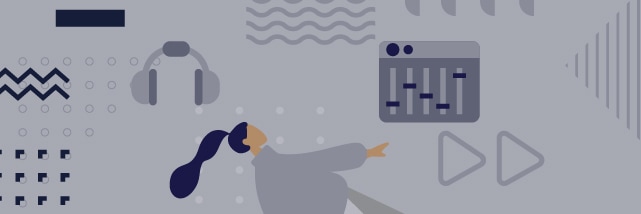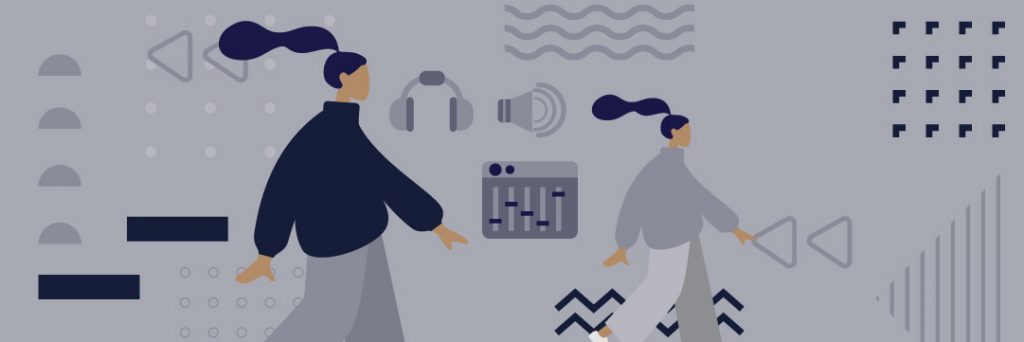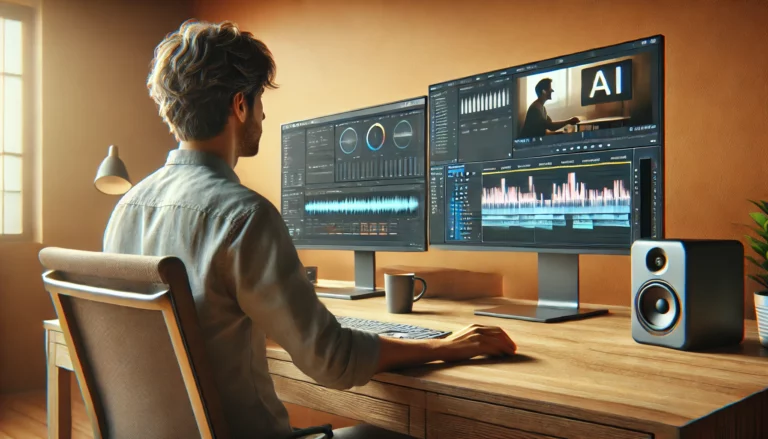If you love music, the first thing that comes to mind is becoming a musician. But what if that is not in the cards? How do you connect the thing you love with a job that pays? The choice of many is becoming a freelance audio engineer. It seems like a springboard to musicianship or the role of a producer.
But the road to getting there is paved with hurdles. Not only that. An audio engineer does not solely sit at the mixing console and record or mix music. There are quite a few other tasks he can, and in most cases must do. So what does any ‘standard’ audio engineer do?
By a general definition, audio engineers use machinery and equipment to record, synchronize, mix, or reproduce music, voices, or sound effects. They work on the production of movies, music recordings, live shows, or video games. They sometimes work under the job titles “sound engineering technician” and “audio equipment technician.” If they work as freelance audio engineers, they are not formally tied to a production company or a studio.
The definition above does not limit the job of audio engineers to just recording sound. “Even if recordings include video, the audio engineer is responsible only for the sounds recorded. Audio engineers also handle equipment necessary for producing the best sound for live performances, such as concerts.”
Audio engineers often attend postsecondary vocational programs, which typically take one year. Such vocational programs give students an opportunity to work hands-on with the type of equipment they will be using as audio engineers. Society of Broadcast Engineers offers an exam to become a certified audio engineer (CEA). Five years of experience in the field are necessary to take the exam (above).
Skills, competencies, and duties
As CareerLancer explains, an audio engineer will not only produce sound. She/he has to take care of “ all other aspects of how to create a recordable and well-mastered sound.” A freelance sound engineer has to learn how to produce music. He needs to bring instrumental and vocal elements together to create music, working in teams.
The duties of the Sound Engineer are split into two groups, production and post-production activities:
Production Activities Include:
- Assessing the acoustics of the performance area and assembling and operating the necessary equipment;
- Consulting with producers and performers to determine the sound requirements;
- Selecting, positioning, adjusting, and operating the equipment used for amplification and recording;
- Applying technical knowledge of sound recording equipment to achieve the determined artistic objectives;
- Recording sound onto digital audio tape or hard disk recorders;
- Monitoring audio signals to detect sound-quality deviations or malfunctions;
- Anticipating and correcting any problems;
- Maintaining and repairing sound equipment.
Post-Production Activities Include:
- Integrating (synchronization) of pre-recorded audio (dialogue, sound effects, and music) with visual content;
- Re-recording and synchronizing audio (post-synching);
- Mixing and balancing speech, effects and music;
- Creating and altering sound effects for use in films, television, etc.
To be successful, though, an audio engineer has to have certain skills that include:
- Musical/Instrument Skills
- Creativity
- Motivation
- Perseverance
- Ability to concentrate for long periods
- Self-confidence
- Mastery of production software like Protools, etc
- Mastering
- Post-production skills
- Sound mixing skills
- Sound Engineering skills
So, what kind of salary do the audio engineers earn? According to the data collected by the U.S. Bureau of Labor Statistics, back in 2017 the median annual salary of an audio engineer was $42,650. Top 10% salary was $85,340, while the bottom 10% salary was $23,160.
Working as a freelance audio engineer
Gray Spark Audio gives a detailed description of what it looks like working as a freelance audio engineer. According to the author, in his 10 yrs or so being in this field, he has faced innumerable challenges and hurdles. But, in the end, it was all worth it. This requires dedication and single-mindedness more than your average job.
The first thing a quality freelance audio engineer has to do is develop her/his skills set. Taking a look at various mix projects, the above author noticed the lack of attention to detail. “Everyone is aiming to provide a service which is as good as their competition.”
“No matter how much you’re getting paid for your first project, your goal should be to deliver a quality of work that is at least 5x of what your competition delivers. When you’re client hears the mix they should be left with a feeling of complete satisfaction. Are you dedicated to putting this amount of work into every project? No matter how small or large?”
This level of quality has to be there, whether the audio engineer is working on a 3d audio production, a radio ad, or a podcast.
For a freelance audio engineer, probably the key part is getting clients. Getting clients brings experience and experience brings the refinement of skills and… more clients. There are a number of ways of acquiring clients as a novice freelancer. These include scouting for artists at shows, giving a free demo, ‘cold calling’, and referrals. Or, a freelancer can register with an agency or online work source like StudioBunny.
But just getting initial clients doesn’t necessarily spell constant work or better earnings. There is always more to be done to become truly successful in this job.

Professional attitude bears quality and brings work
As Nicole Vulcan, one of the seasoned professionals note, just getting basic training in audio engineering will not cut it. Any professional audio engineer has to constantly keep in touch with all the current trends in audio production. As a freelancer, he also has to follow the industry trends to see which branch is in demand for their skill set.
As a novice, it is very hard to get a sound production job of any kind. To cross that hurdle, Vulcan recommends freelancers “to start volunteering at a local community radio station, community playhouse or recording studio and to get trained in engineering and recording techniques on the job. If you have no experience, volunteering may be the way to go. You will get to immerse yourself in the industry and find out whether this career is the direction you want to take.”
To make a freelance career work, your clients will want to know that you have worked in the industry and know some of the players in your community. Like most of the entertainment industry, it’s all about who you know (above).
A freelance audio engineer in most cases needs to work from home. That means she/he needs to assemble their own recording equipment and build a recording studio. This may take time. They can put together a basic recording studio with a few decent microphones, proper acoustics, a recording computer, and a mixing board for a few thousand dollars. That usually means buying used equipment. If They don’t have the option of setting up their own studio, network with other studio owners and ask them to use their facilities for a studio fee.
Other steps freelance audio engineers need to take to be successful
One way to gain both clientele and experience is to “offer to do engineering jobs for local bands, voice actors or nonprofits for free.” An essential step for freelance audio engineers is to set up a website or social media platform that features some of the work they’ve done.
They should state clearly on the site that they’re available on a freelance basis. Posting audio clips of their work is essential. What potential customers will be interested in is whether they can deliver the type of sound they want.
This step is essential, whether they register with an online work source like BunnyStudio or not. A professionally done personal website is practically a part of the interview if the freelancer gets short-listed for a potential sound project.
Another step is networking with potential clients at industry events. Some other steps include:
- Go to mixers organized by the local theater professionals in their area.
- Join the Audio Engineering Society or the National Association of Broadcasters.
- Attend their conferences to get new ideas and network with other people who may lead you to new clients.
But, as Careerlancer (above) notes, for a freelance audio engineer to be successful, there is a number of other things that can help them, including:
- Mastering at least one instrument;
- Be able to edit, recreate and even create sounds as needed;
- Develop social skills;
- Build up recommendations;
- Getting out of their comfort zone as a music producer, i.e. taking up advanced jobs that require a deeper understanding of languages and socio-cultural norms;
- Be adept at post-production and be able to spot mastering errors or gaps in a track;
- Keep working constantly on further developing their skills.
Hiring a freelance audio engineer
So, it is quite obvious that working as a freelance audio engineer is filled with possible hurdles, but ultimately quite rewarding. The same can be said about the tasks facing their potential employers.
Hiring exactly the right freelance audio engineer can be an arduous and protracted process. At the same time, getting the right person for the project or a set of recording projects can bring excellent rewards.
The first requirement is being certain about exactly what kind of sound or you require for the upcoming project. Is it a music-only project, a music/video combination, an ad, a podcast, or something else?
Taking a listen to work samples can take time. Limiting that listening to samples of two to three potential candidates will save both time and resources. Taking a detailed look at their personal websites and ding the final interviews should clinch the process.
Possibly, one of the potential freelance audio engineers waits for you here at BunnyStudio too. Feel free to take a look through the list of available freelancers.









